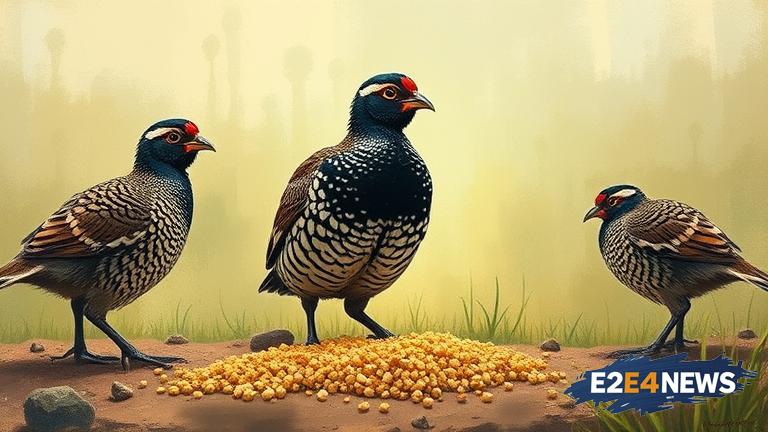A groundbreaking study has shed light on the vast potential of black soldier fly as a feed source for quails, paving the way for a more sustainable and environmentally friendly approach to poultry farming. The research, which focused on the nutritional value and feasibility of using black soldier fly as a feed supplement, revealed promising results. Quails fed with black soldier fly-based feed exhibited improved growth rates, enhanced feed conversion ratios, and better overall health. The black soldier fly, a species of insect known for its high protein content and rapid reproduction rate, has been gaining attention in recent years as a viable alternative to traditional feed sources. The study’s findings suggest that black soldier fly can be a valuable addition to quail feed, providing a rich source of protein, micronutrients, and other essential nutrients. Furthermore, the use of black soldier fly as a feed source can help reduce the environmental impact of quail farming, as it requires less land, water, and feed than traditional farming methods. The black soldier fly’s ability to thrive on organic waste also makes it an attractive option for reducing waste management costs. In addition, the study highlighted the potential for black soldier fly to improve the nutritional quality of quail meat, making it a more appealing option for health-conscious consumers. The research also explored the economic viability of using black soldier fly as a feed source, with results indicating that it can be a cost-effective alternative to traditional feed sources. As the demand for sustainable and eco-friendly food production continues to grow, the use of black soldier fly as a feed source for quails is poised to play a significant role in shaping the future of poultry farming. The study’s findings have significant implications for the quail farming industry, as they suggest that black soldier fly can be a valuable tool in reducing production costs, improving animal health, and promoting sustainable farming practices. Moreover, the use of black soldier fly as a feed source can help reduce the industry’s reliance on resource-intensive feed sources, such as soybean meal and fishmeal. The black soldier fly’s high protein content and rapid reproduction rate make it an ideal candidate for large-scale feed production, and its ability to thrive on organic waste reduces the need for arable land and other resources. As the world grapples with the challenges of food security, sustainability, and environmental degradation, the use of black soldier fly as a feed source for quails offers a promising solution. The study’s results have sparked interest among quail farmers, feed manufacturers, and researchers, who are eager to explore the potential of black soldier fly as a feed source. With its rich nutritional profile, low environmental impact, and cost-effectiveness, black soldier fly is poised to revolutionize the quail farming industry. As research continues to uncover the benefits of using black soldier fly as a feed source, it is likely that we will see a significant shift towards more sustainable and eco-friendly farming practices in the years to come. The study’s findings have also highlighted the need for further research into the use of black soldier fly as a feed source, particularly in terms of its potential to improve animal health and reduce the environmental impact of quail farming. In conclusion, the study’s results demonstrate the high potential of black soldier fly as a feed source for quails, offering a promising alternative to traditional feed sources and paving the way for a more sustainable and environmentally friendly approach to poultry farming.
